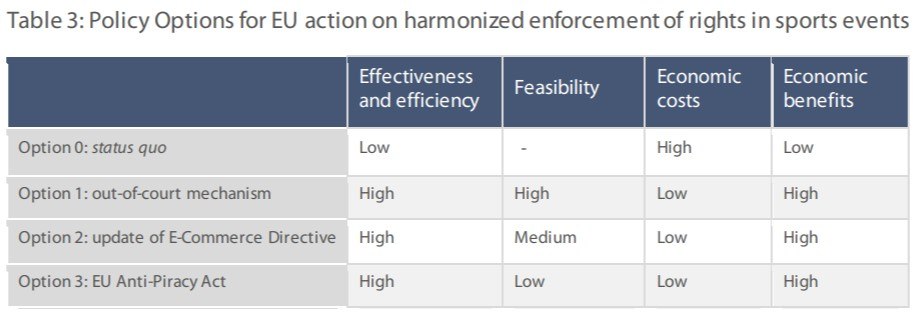In recent years the European Commission has proposed and adopted various legislative changes to help combat online piracy.
This includes the Copyright Directive which passed last year as well as the Digital Services Act, which was officially unveiled last week.
New EU Study Piracy of Sports Events
These laws aim to help copyright holders enforce their rights. However, according to a new report from the European Parliamentary Research Service, more changes are needed. Especially to protect the rights of sports event organizers.
The new study, released by the research service’s European Added Value Unit, suggests implementing new policies, including an “EU Anti-Piracy Act”. This is needed to deal with the increasing losses to copyright holders and the tax coffers of EU countries.
Relying on earlier research, the study estimates that there were 7.6 million subscriptions to illegal IPTV services in 2019. This generated €522 million in revenues and resulted in €113.5 million in missed annual VAT payments.
“If the same number of subscriptions were made legally, legal broadcasters’ revenues could increase by €3.4 billion each year,” the study estimates
“In addition to these revenue losses, legal broadcasters also suffer impacts on employment due to online piracy. The most cautious estimate suggests that each year up to 16,000 potential new jobs are lost as a result of online piracy of broadcasts of sports events.”
Policy Changes are Required
The EU study proposes several changes that could help to better tackle the streaming piracy problem. This is needed, it argues, because current enforcement tools are inefficient and differ from country to country.
One policy option could be to provide a new neighboring right over sports events. An even better option, according to the study, would be to grant a right of communication to the public to the producers of audiovisual works, including sports events.
The ‘communication to the public right,’ paired with the right of sports organizers to sue ‘infringers’ without the involvement of licensees, would be most effective.
EU-wide Blocking Injunctions
On top of this proposal, the study also suggests making dynamic blocking injunctions available in all EU countries and to allow rightsholders to instantly disrupt piracy when needed.
“A possible solution would be to implement a system of fast, dynamic and live blocking orders, harmonized at EU level through the use of ‘dynamic blocking orders’ and ‘live injunctions’.
“Along with the latter, it is necessary to adopt a legal provision granting sports events organizers (and any other producers of ‘premium’ content) the right to remove illicit content directly – through technological means – from any streaming server used by pirates.”
From Voluntary Agreements to a New Anti-Piracy Act
While there is no shortage of enforcement options and proposals, implementing these can be a challenge. The researchers have thought about this as well and give four future scenarios.
One could be to do nothing and rely on existing legal tools. However, the study concludes that this isn’t really an option, as piracy will remain a massive problem.
The first real option, according to the report, is to tackle the problems with voluntary agreements and private partnerships. For example, hosting providers could agree to shut down pirated content when asked, and ISPs could help to block sites and services.
“This solution, indeed, would have a high impact on the system, allowing a coordinated real-time take-down of pirated content, without causing further burden to courts and administrative authorities and alleviating costs and timing of public enforcement.
“The chances, however, to develop a network of code of conducts harmonized and available throughout the entire EU territory does not seem to be significant.”
The second option would be to update current laws, such as the E-Commerce Directive and the InfoSoc Directive, to ensure that the much-needed extra enforcement options can be implemented.
These changes are possible, the study notes, but the implementation into local laws may result in fragmentation and differences between EU Member States, something the researchers want to rule out.
New Anti-Piracy Act Most Efficient
The preferred option, therefore, is to adopt a new EU Anti-Piracy Act that includes all proposed changes.
“The most impacting proposition – Option 3 – would consist in the adoption of an ‘EU Antipiracy Act’, in the form of a newly adopted EU Regulation, providing for all those legal tools necessary to deploy an efficient digital enforcement against piracy,” the study concludes.
This new law wouldn’t change existing legislation but would be tailored specifically to piracy of sports events and other premium copyrighted content. That also includes music, films, and games.
The proposals are far-reaching and will be welcomed by copyright holders. However, the study also stresses that the feasibility is low, as implementing new EU legislation isn’t straightforward.
For now, this means that the EU Anti-Piracy Act is just another idea.
—
A copy of the European Parliamentary Research Service study titled “Challenges facing sports event organisers in the digital environment” is available here (pdf)


 In recent years the European Commission has proposed and adopted various legislative changes to help combat online piracy.
In recent years the European Commission has proposed and adopted various legislative changes to help combat online piracy. 




